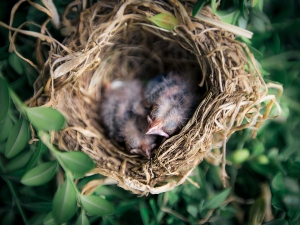
Birds are all around us; they live in the wild, in locations untouched by humans, beside humans in rural areas, and in cities and urbanized areas.
They have adapted to live in various locations and thrive in them as well. People bring birds from the wild into urban areas to be domesticated, but what about releasing baby birds into the wild? If you want to know if you should do this and how to do it, then read on.
Releasing a baby bird back into the wild will give it the opportunity to live in its natural habitat but it can also greatly decrease its chances of living a long life. Many birds that live in captivity can live up to 20 years old, in the wild, smaller birds live on average up to one to two years old
Table of Contents
Releasing baby birds back into the wild
To do or not to do? This can be a hard question to answer, especially when it’s whether to keep or release a baby fledgling bird back into the wild.
Releasing it can be difficult if you have become attached to the little one. There are several factors to consider when choosing whether to keep them or let them go back into the wild.
Birds that live in captivity have access to ample amounts of food, water, and medication if needed, and are not exposed to predators. Life in the wild is generally more difficult.
The chances of them surviving after being released into the wild are really 50/50. They could survive or just as quickly become a small snack for a predator. If you are going to release a fledgling into the wild you need to have a plan.
How do you release a fledgling bird?
If you want the bird to have the best chance at survival, there needs to be a planned approach to releasing a bird back into the wild, especially if it’s a newly fledged baby bird.
Diurnal birds (birds that sleep at night) should be released in the early morning, and nocturnal birds (birds that sleep in the day) should be released at night; this gives them more time to adjust naturally.
It’s best to ease into release over time by first visiting the location you want to release your bird in (and bring your bird along), which allows them to become familiar with it over time. After many visits, you can do a full release.
Can a caged bird survive in the wild?
A caged bird successfully surviving in the wild depends on a number of factors.
Most birds are territorial; if you release a fledgling into the territory of other birds, they can and usually will suffer some serious harassment from the dominating birds in that territory.
Another issue, that the bird needs to tackle, is finding a welcoming flock. Many birds depend on a flock to survive. Finding a flock that accepts your fledgling bird can be a challenge.
After being taken care of by you for a short or a long time, birds will become dependent on you, it will imprint on you, and become naturally tamer than wild birds.
This tameness makes them more vulnerable to other animals and humans.
For example, if they become friendly with pet dogs, they will usually not take cover when predators that look like dogs cross paths with them in the wild.
Their dependence on you with regards to food can be a disadvantage because they naturally won’t hunt for food, but rather feel dependent on you to offer food.
Can a fledgling survive on its own?
Yes, a fledgling can survive on its own. There are many cases of fledgling birds that have survived on their own in the wild.
Wildlife rehabilitators have even worked out how to stage the release of fledgling birds back into the wild, pretty much down to a science.
Do birds come back after they fly away?
Some birds prefer to live in the comfort of your care, and because of this, they will make their way back to their human pals.
Most birds that come back after they fly away are the birds that have imprinted on humans, they imprint after spending a lot of time with their human friends.
FAQ:
Do birds remove baby birds from nest?
No, baby birds aren’t removed from their nests by their parents.
These little animals live in the nest until they are old enough to be independent and are ready to fly. This is a natural and not forced process.
What to do after saving a baby bird?
If you have a baby bird, and can’t reunite it with its parents, then the next best thing would be to take the bird to a wildlife rehabilitation center.
The professionals at this center will know how to raise the baby bird
Conclusion
In conclusion, you can release a baby bird into the wild, but its chances of living a long life are reduced in the wild. If you’re adamant about releasing them, then slowly get them used to the new location by visiting it often with them.
A fledgling can survive on its own in the wild, so hope for the best when you release it. If the bird decides to come back, then it has probably imprinted on you.
If you enjoyed this article then you may also be interested in other bird related articles. Here are some articles that you may be interested in: Why do baby birds die in the nest?, Do birds sleep in the same place every night?, Can pigeon eggs hatch without a mother on them?, Do all birds make nests?

